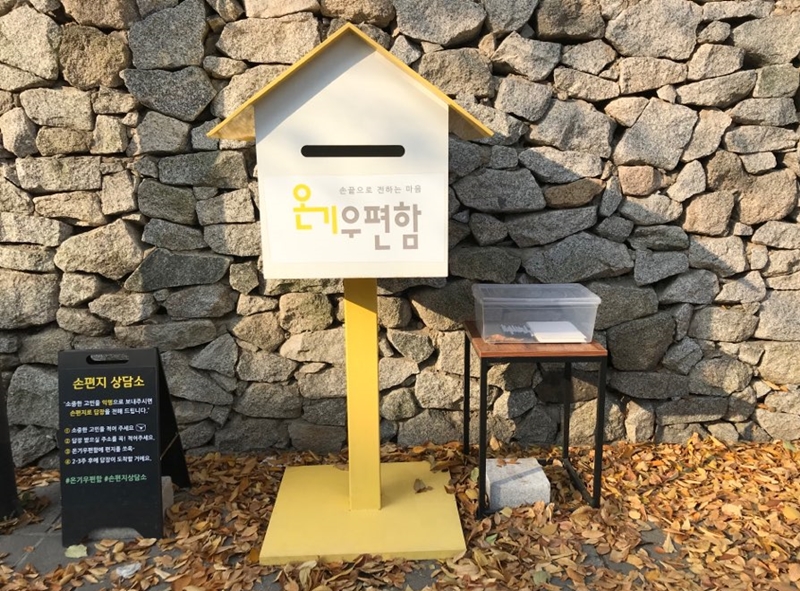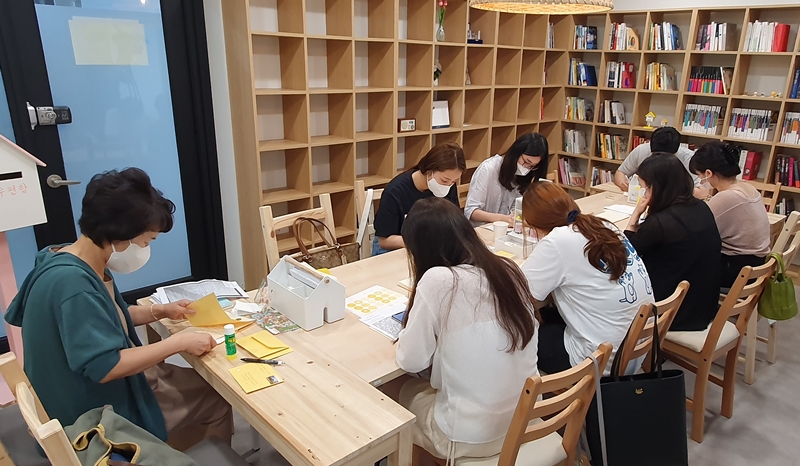By Lee Kyoung Mi and Lee Jihae
Video = Lee Junyoung
A yellow postbox appears on the stonewall road of Seoul's Samcheong-dong neighborhood. Inscribed with the phrase "Conveying hearts with fingertips: Ongi (Warmth) Postbox," this is no ordinary mailbox.
Next to the postbox is a sign with instructions along with paper and pens. Anyone who writes something on a piece of paper and puts it in the postbox can expect a response in two to three weeks. The sender's name is not needed. So is this a fairytale?
The non-profit organization Ongi Post runs this charitable service. CEO Cho Hyunsik from February 2017, when he was attending university, began receiving and responding to these letters anonymously out of a desire to "offer warm words to others."

An Ongi Post postbox is on the stonewall road of the Samcheong-dong neighborhood of Seoul's Jongno-gu District. Nine such postboxes are in the capital, with the letters in them collected every Thursday. (Ongi Post)
Ongi has postboxes installed in nine places in Seoul, including Samcheong-dong, Deoksugung Stonewall Walkway and the districts of Daehangno, Myeongdong and Noryangjin. Letters to the service can also be sent online instead of through handwritten letters via the post office, and responses can also be written and received in foreign languages.
Cho initially ran the service with his own money, but the Korea Postal Service Agency now pays for the stamps and 170 volunteers dubbed "Ongi postal carriers" each pitch in KRW 10,000 per month to cover operating costs.
The CEO said the number of letters expressing lethargy, isolation and depression has surged since the onset of the COVID-19 pandemic. Many foreign nationals in Korea including tourists sent letters in languages like English, Japanese and Chinese (Mandarin) before the coronavirus hit, though the number has fallen a bit. With the number of foreign students and tourists in Korea declining due to the pandemic, the number of their letters has also decreased.
The letters from foreign nationals express worry ranging from small matters to concerns over a writer's dreams and future. Many letters convey the writers' struggles to adjust to life in Korea and their loneliness. Volunteers who studied abroad in the writers' home countries or have similar experiences write the responses, as they can better understand the situations.

Seven "Ongi postal carriers," or volunteers who respond to letters from anonymous writers about their worries, on July 2 read letters and write responses for about two hours at the Ongi Post office in Seoul's Gangnam-gu District. (Lee Kyoung Mi)
Seven "Ongi postal carriers," or volunteers who hand write responses to the letters submitted to Ongi, on July 2 gathered at the company's office in Seoul's Gangnam-gu District. They included people of various ages and backgrounds including a 20-something college student, a 30-something designer, a mother in her 60s, a firefighter and a Chinese national who just recently joined.
About 10 of the volunteers gather daily and send about 100 responses a week. A combined 10,112 responses went out between the service's debut in 2017 and last month.
Joining the Ongi volunteer corps has no major requirements.
"What matters is how much you care and write the letters with sincerity," Cho said. "Worry is absolute, so we abide by the rules of never telling the writers that everyone goes through the same thing or responding in a bossy manner."
km137426@korea.kr